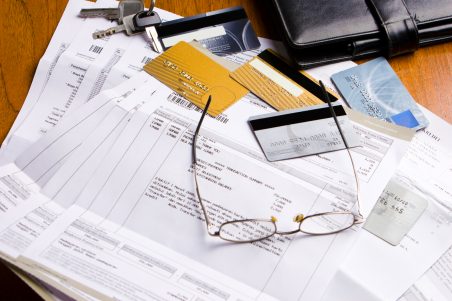7 Leading Causes of Credit Card Debt

Credit card debt is a widespread problem in the US: an estimated 29 million Americans have carried a credit card balance for more than two years, while 1 in 4 do not regularly pay off their balances each month. In total, Americans owe nearly $784 billion to credit card companies, while individual households owe an average of $17,000.
Here’s a statistic that really puts the strain of credit card debt in perspective: The median US household earns about $59,000 per year, making the average credit card burden nearly 29 percent of income. No wonder Americans can’t seem to pay off their balances.
Why are US households carrying so much debt these days? Here are 7 major sources of credit card debt:
- Daily living expenses. Americans may be earning more than they used to, but the cost of living has been outpacing household income for more than 13 years. While income has grown by 28 percent since 2003, the overall cost of living has grown 30 percent. Two percent might not seem significant; however, some costs have skyrocketed, such as food and beverage prices (38 percent). Many households, especially those earning $30,000 or less, have had to turn to credit cards to cover groceries, childcare, and utilities.
- Retail shopping. People are swiping their plastic to make luxury purchases, such as clothing and shoes, electronics, and other unnecessary household goods. Most tend not to realize how individual purchases add up when they’re paying with borrowed money. To boot, retail stores are adept at manipulating emotions, encouraging impulsive behavior and distorting desire into need.
- Medical bills. Since 2003, the costs of medical care have soared by 57 percent – more than twice that of income growth. Certain groups are more prone to rack up credit card balances than others, including the underemployed and unemployed as well as senior citizens.
- Home repairs. The average cost for repair and general maintenance for US homes is about $170 per month. This may not seem like a lot, but many first-time home buyers forget to budget for such expenses and end up stretching their finances to the limits. And what about larger repairs? Replacing a roof typically costs more than $7,000, while plumbers charge about $125 per hour and electricians $100 or more per hour.
- Vacation expenses. Believe it or not, higher income earners in the $75,000 plus bracket are more likely to carry credit card balances than lower income earners, citing vacations and home repairs as the leading contributors to their debt. That’s because high income earners tend to have higher credit limits, multiplying opportunities to overspend. And while everyone deserves a respite from the pressures of work life, we can’t all enjoy private yachts and caviar – there are plenty of shoestring travel options out there and vacations to suit every budget.
- Car repairs and maintenance. The economics of owning a car are more complex than monthly auto loan and car insurance payments. Before purchasing a car, people should also budget for gas, registration and parking fees, and maintenance and repairs. While a routine oil change costs about $50, the cost to repair or replace certain engine parts can bring about financial disaster – consider the cost to replace the transmission at $4,000 to $5,000.
- Interest charges. An oft overlooked cost of credit card usage, interest adds up. US households pay an average of about $1,300 in interest charges per year. If Americans are struggling to cover their monthly bills, interest only makes their situation more precarious.
Of course, there are many other sources of credit card debt, including divorce, unexpected business costs, identity theft, unhealthy behaviors such as gambling, and taxes. Whatever the cause, there is no need to feel ashamed about credit card debt, and there are always a variety of debt relief options available to you.
If you are like many Americans who are struggling to pay off their credit card debt, New Era Debt Solutions may be able to provide you relief. We’re a debt settlement company that helps people dramatically reduce their debt obligation and become debt free.
To see if debt settlement is the right option for you, please contact us or fill out our form on this page for your free debt analysis.
